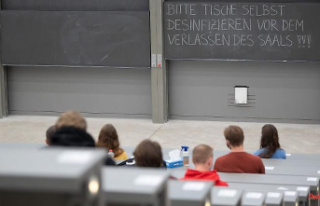If you want to study as a school leaver, look at the possible admission restrictions. With the numerus clausus, the universities control the lack of study places. But it is declining nationwide - with exceptions.
Magdeburg/Gütersloh (dpa/sa) - In Saxony-Anhalt, the proportion of courses with restricted admission is well below the national average. In addition, it has continued to fall, according to a study by the Center for Higher Education Development (CHE) in Gütersloh. Accordingly, the proportion of subjects with numerus clausus (NC) in the winter semester 2022/2023 is 27.1 percent after 28.9 percent at the same time last year. The national average fell slightly in the same period from 40.1 to 39.7 percent. The trend of the past few years continued, the CHE announced on Wednesday.
The authors of the study by the CHE, a joint subsidiary of the Bertelsmann Foundation and the German Rectors' Conference (HRK), point out that school leavers in the federal states must expect considerable deviations from the national average. Hamburg, Saarland and Berlin have an NC in over 60 percent of the subjects, while Rhineland-Palatinate and Thuringia only have a share of less than 25 percent.
In Saxony-Anhalt, courses in law, economics, social sciences and social sciences are most frequently restricted (37.6%), while courses in languages and cultural studies only account for 13.6 percent. The rate is 18 percent in engineering and 26 percent in mathematics and natural sciences.
In the case of a subject with admission restrictions, the university sets a maximum number of students to be accepted (closed number, numerus clausus). School leavers then have to apply for a place. The selection is then made on the basis of grades, test results or professional experience.












